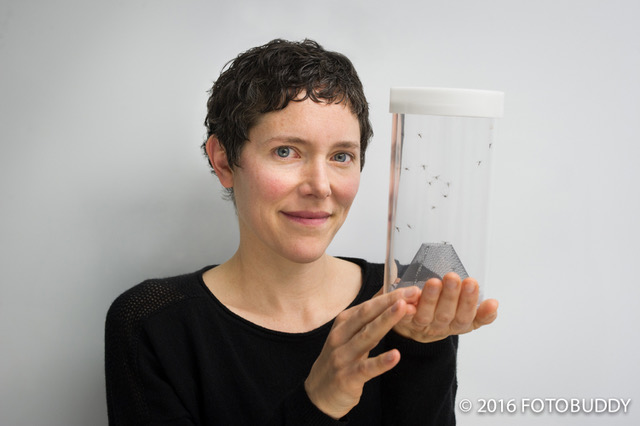Taking a Bite Out of Mosquito Genetics
Every few years, Lindy McBride travels to Kenya for four weeks to collect bugs. She and her team will knock on village doors and go into the forest to set traps. During their stay, the research team collects hundreds of different mosquitoes to bring back to the United States for study.
There are over 3000 kinds of mosquitoes on Earth. Most are opportunistic. They will bite whatever comes their way. But the type of mosquito that Lindy studies is a specialist. It only bites humans.
When an insect focuses on one source of food, their whole biology changes. These mosquitoes bite humans, and have evolved interesting adaptations that allow them to do that. Their ability to recognize how a human smells, for example, is uncanny. Smell is more important than vision for most insects. They recognize what they eat by how it smells.
Interestingly, these mosquitoes probably evolved to target humans relatively recently – within the past 10,000 years. They still have relatives in Africa that live in forests and bite animals. These relatives represent what the species was thousands of years ago. Lindy and her team can see how different the two varieties are in the lab. They put 100 mosquitoes in a box and given them a choice between human scent and guinea pig scent. The animal-biting variety mostly goes to the guinea pig. The human-hunting variety will choose human odor 99% of the time.
The research team is really interested in what changes in the genome and brain of a mosquito cause it to love human odor so much. First they look for the causal genes. They mate the two types of mosquitoes in the lab to create hybrids. Some hybrids like humans. Others prefer guinea pigs. The team looks for genes that always seem to show up in the human-loving hybrids.
The research team can also look into the brains of both mosquitoes to find differences in neurons that respond to odor. They aim to link the changes in genes to the changes in neurons. They also hope to uncover which combination of chemicals in human scent are recognized by mosquitoes. This information may be used to design new repellants and attractive baits to reduce human-biting and disease transmission.
The future of this research includes:
-
Cracking the human odor code in the mosquito brain: Human odor is made up of hundreds of different compounds, none of which are unique to humans. Mosquitoes have evolved to recognize humans by the particular combination, or blend, of compounds we give off. McBride’s research team is working to crack the mosquito code for human odor so that artificial blends that draw dangerous, disease-vectoring species away from humans and into lethal traps can be developed.
-
The evolutionary changes that cause certain mosquitoes to love humans: The mosquito that transmits Zika, dengue, chikungunya, and yellow fever was transformed by evolution from a wild, forest-dwelling species that bites animals to a domestic, city-dwelling species that specializes in biting humans. McBride’s team is working to understand what has changed in the genetic makeup and brain of these mosquitoes to draw one to animals and the other to humans.
Mosquitoes kill more people than any other animal - by transmitting diseases like malaria, yellow fever, dengue fever, and zika. But not all mosquitoes are dangerous to humans. There are about 3000 species of mosquitoes worldwide. Only a handful are good at transmitting human disease, because they love biting humans. Lindy McBride is a Princeton University scientist working to identify what genetic features allow these human-biting mosquitoes to target humans over other animals.
Bio
Lindy McBride began her journey into Evolutionary Science as a child watching birds. She found herself fascinated by the endless variety of body shapes, color patterns, and songs. Later, McBride developed a similar fascination for the insect diversity. Lindy received her B.A. from Williams College in 1998. She then sought additional research and life experience as a field assistant in the upper Amazon of Peru, an independent Fulbright Fellow in Tanzania, and an Outward Bound canoe instructor in northern Minnesota. She received her Ph.D. in Evolutionary Biology from the University of California at Davis in 2008 and then conducted postdoctoral research in neurogenetics and behavior with Dr. Leslie Vosshall at The Rockefeller University. She started her own laboratory at Princeton University in September 2014. She has since received several new investigator awards, including the Rosalind Franklin Award, Pew Scholar Award, Searle Scholar Award, and Klingenstein-Simons Fellowship.


